Reflective Learning, Feedback: Orientation for Success in Education
VerifiedAdded on 2023/06/10
|9
|1942
|450
Essay
AI Summary
This essay delves into the significance of reflective learning in higher education, emphasizing its role in enabling students to articulate their thoughts, experiences, and learning effectively. It explores various reflective approaches, including Gibbs' reflective cycle, and discusses the importance of feedback and feedforward mechanisms in improving student performance. The essay also differentiates between formative and summative assessments, highlighting how both contribute to student learning and academic progress. Ultimately, the essay concludes that reflective learning and constructive feedback are essential for students to identify areas for improvement, develop effective strategies, and achieve their academic goals in higher education. This resource is available on Desklib, a platform offering a wide range of study tools and solved assignments for students.
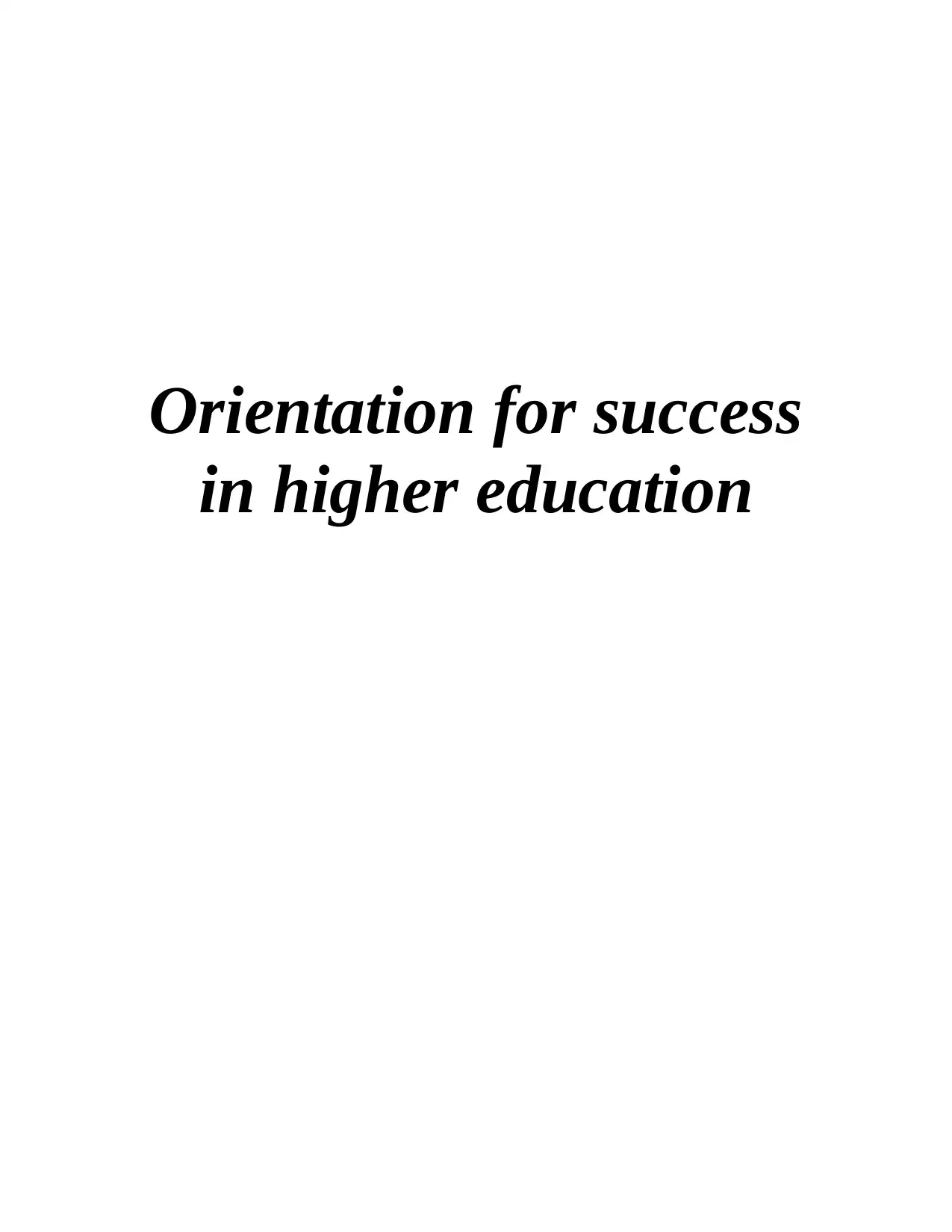
Orientation for success
in higher education
in higher education
Paraphrase This Document
Need a fresh take? Get an instant paraphrase of this document with our AI Paraphraser
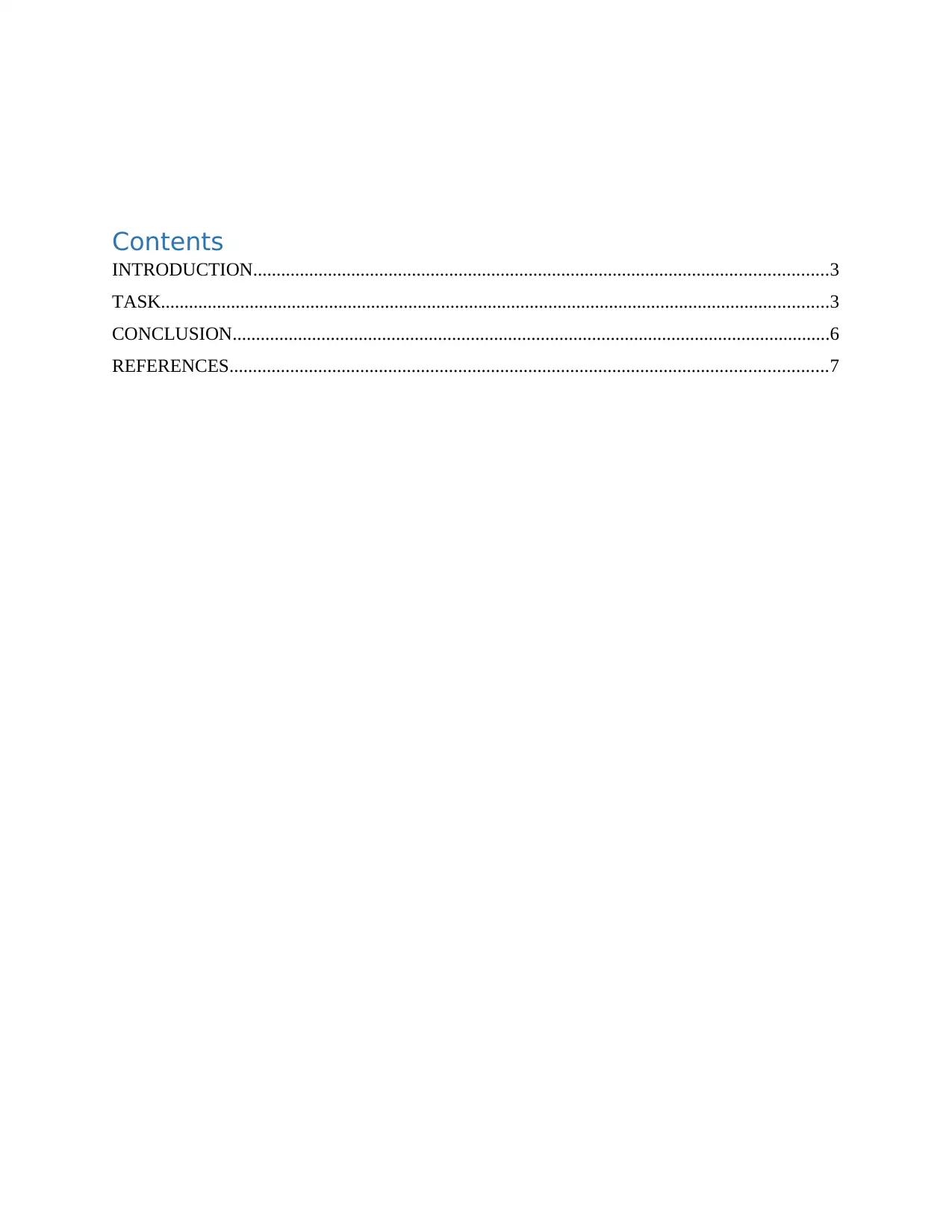
Contents
INTRODUCTION...........................................................................................................................3
TASK...............................................................................................................................................3
CONCLUSION................................................................................................................................6
REFERENCES................................................................................................................................7
INTRODUCTION...........................................................................................................................3
TASK...............................................................................................................................................3
CONCLUSION................................................................................................................................6
REFERENCES................................................................................................................................7
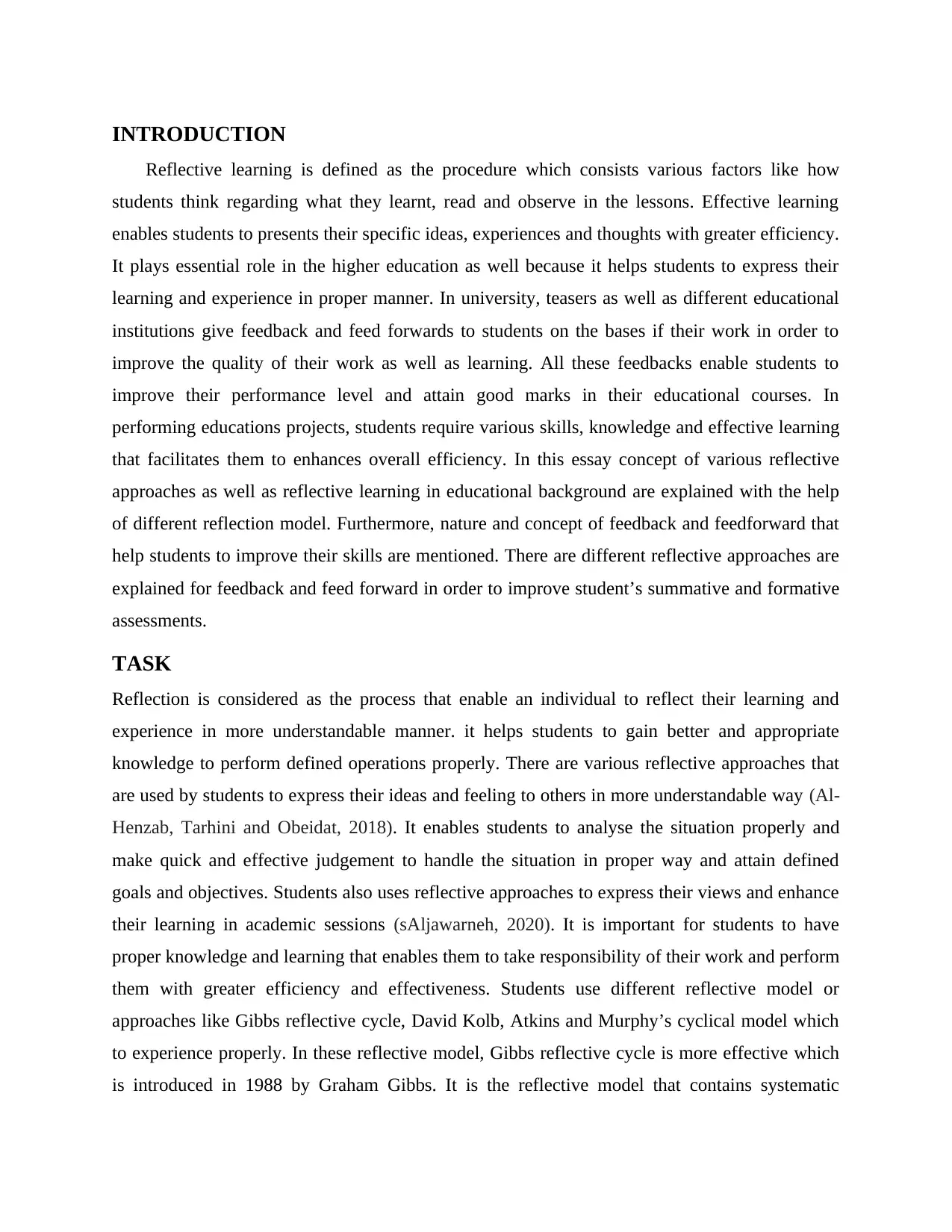
INTRODUCTION
Reflective learning is defined as the procedure which consists various factors like how
students think regarding what they learnt, read and observe in the lessons. Effective learning
enables students to presents their specific ideas, experiences and thoughts with greater efficiency.
It plays essential role in the higher education as well because it helps students to express their
learning and experience in proper manner. In university, teasers as well as different educational
institutions give feedback and feed forwards to students on the bases if their work in order to
improve the quality of their work as well as learning. All these feedbacks enable students to
improve their performance level and attain good marks in their educational courses. In
performing educations projects, students require various skills, knowledge and effective learning
that facilitates them to enhances overall efficiency. In this essay concept of various reflective
approaches as well as reflective learning in educational background are explained with the help
of different reflection model. Furthermore, nature and concept of feedback and feedforward that
help students to improve their skills are mentioned. There are different reflective approaches are
explained for feedback and feed forward in order to improve student’s summative and formative
assessments.
TASK
Reflection is considered as the process that enable an individual to reflect their learning and
experience in more understandable manner. it helps students to gain better and appropriate
knowledge to perform defined operations properly. There are various reflective approaches that
are used by students to express their ideas and feeling to others in more understandable way (Al-
Henzab, Tarhini and Obeidat, 2018). It enables students to analyse the situation properly and
make quick and effective judgement to handle the situation in proper way and attain defined
goals and objectives. Students also uses reflective approaches to express their views and enhance
their learning in academic sessions (sAljawarneh, 2020). It is important for students to have
proper knowledge and learning that enables them to take responsibility of their work and perform
them with greater efficiency and effectiveness. Students use different reflective model or
approaches like Gibbs reflective cycle, David Kolb, Atkins and Murphy’s cyclical model which
to experience properly. In these reflective model, Gibbs reflective cycle is more effective which
is introduced in 1988 by Graham Gibbs. It is the reflective model that contains systematic
Reflective learning is defined as the procedure which consists various factors like how
students think regarding what they learnt, read and observe in the lessons. Effective learning
enables students to presents their specific ideas, experiences and thoughts with greater efficiency.
It plays essential role in the higher education as well because it helps students to express their
learning and experience in proper manner. In university, teasers as well as different educational
institutions give feedback and feed forwards to students on the bases if their work in order to
improve the quality of their work as well as learning. All these feedbacks enable students to
improve their performance level and attain good marks in their educational courses. In
performing educations projects, students require various skills, knowledge and effective learning
that facilitates them to enhances overall efficiency. In this essay concept of various reflective
approaches as well as reflective learning in educational background are explained with the help
of different reflection model. Furthermore, nature and concept of feedback and feedforward that
help students to improve their skills are mentioned. There are different reflective approaches are
explained for feedback and feed forward in order to improve student’s summative and formative
assessments.
TASK
Reflection is considered as the process that enable an individual to reflect their learning and
experience in more understandable manner. it helps students to gain better and appropriate
knowledge to perform defined operations properly. There are various reflective approaches that
are used by students to express their ideas and feeling to others in more understandable way (Al-
Henzab, Tarhini and Obeidat, 2018). It enables students to analyse the situation properly and
make quick and effective judgement to handle the situation in proper way and attain defined
goals and objectives. Students also uses reflective approaches to express their views and enhance
their learning in academic sessions (sAljawarneh, 2020). It is important for students to have
proper knowledge and learning that enables them to take responsibility of their work and perform
them with greater efficiency and effectiveness. Students use different reflective model or
approaches like Gibbs reflective cycle, David Kolb, Atkins and Murphy’s cyclical model which
to experience properly. In these reflective model, Gibbs reflective cycle is more effective which
is introduced in 1988 by Graham Gibbs. It is the reflective model that contains systematic
⊘ This is a preview!⊘
Do you want full access?
Subscribe today to unlock all pages.

Trusted by 1+ million students worldwide
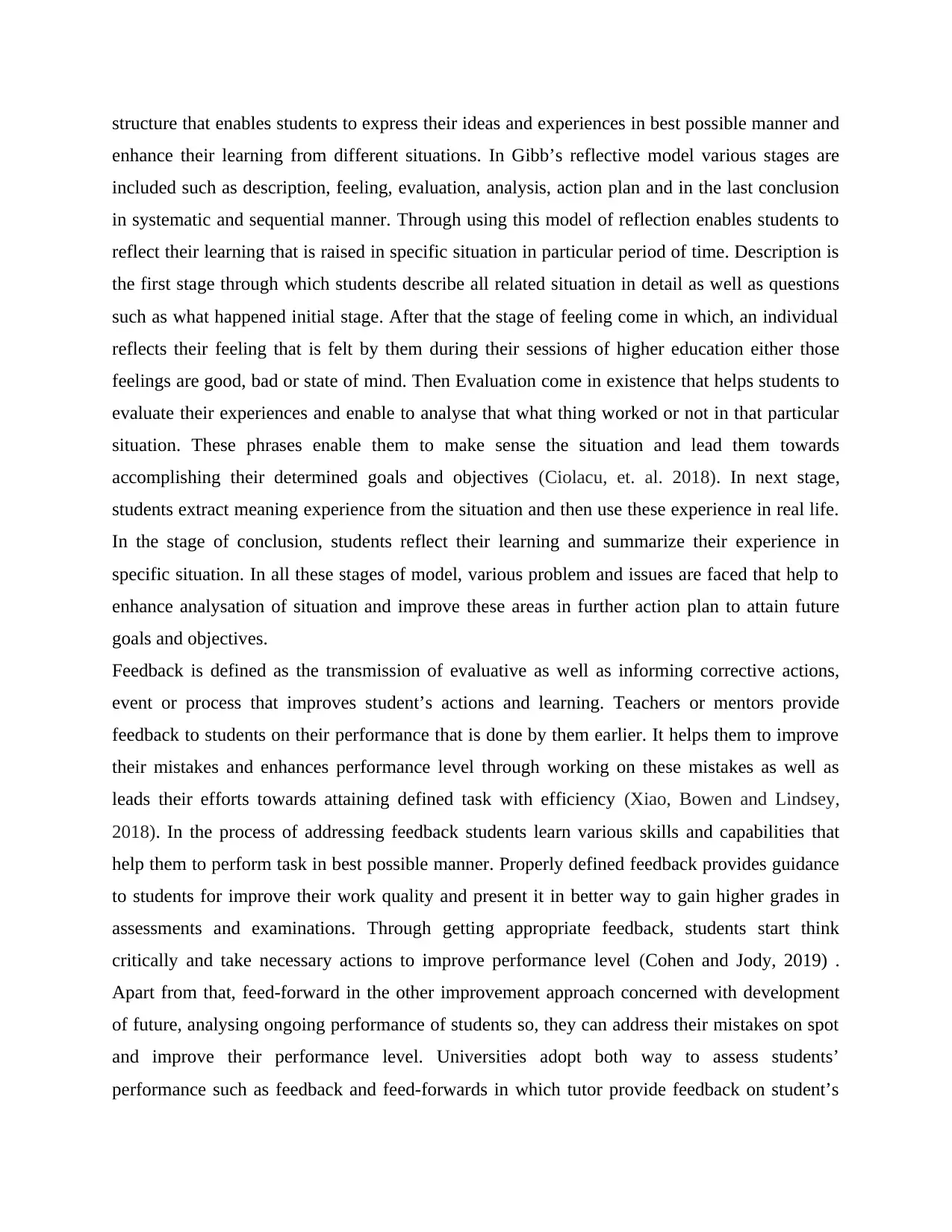
structure that enables students to express their ideas and experiences in best possible manner and
enhance their learning from different situations. In Gibb’s reflective model various stages are
included such as description, feeling, evaluation, analysis, action plan and in the last conclusion
in systematic and sequential manner. Through using this model of reflection enables students to
reflect their learning that is raised in specific situation in particular period of time. Description is
the first stage through which students describe all related situation in detail as well as questions
such as what happened initial stage. After that the stage of feeling come in which, an individual
reflects their feeling that is felt by them during their sessions of higher education either those
feelings are good, bad or state of mind. Then Evaluation come in existence that helps students to
evaluate their experiences and enable to analyse that what thing worked or not in that particular
situation. These phrases enable them to make sense the situation and lead them towards
accomplishing their determined goals and objectives (Ciolacu, et. al. 2018). In next stage,
students extract meaning experience from the situation and then use these experience in real life.
In the stage of conclusion, students reflect their learning and summarize their experience in
specific situation. In all these stages of model, various problem and issues are faced that help to
enhance analysation of situation and improve these areas in further action plan to attain future
goals and objectives.
Feedback is defined as the transmission of evaluative as well as informing corrective actions,
event or process that improves student’s actions and learning. Teachers or mentors provide
feedback to students on their performance that is done by them earlier. It helps them to improve
their mistakes and enhances performance level through working on these mistakes as well as
leads their efforts towards attaining defined task with efficiency (Xiao, Bowen and Lindsey,
2018). In the process of addressing feedback students learn various skills and capabilities that
help them to perform task in best possible manner. Properly defined feedback provides guidance
to students for improve their work quality and present it in better way to gain higher grades in
assessments and examinations. Through getting appropriate feedback, students start think
critically and take necessary actions to improve performance level (Cohen and Jody, 2019) .
Apart from that, feed-forward in the other improvement approach concerned with development
of future, analysing ongoing performance of students so, they can address their mistakes on spot
and improve their performance level. Universities adopt both way to assess students’
performance such as feedback and feed-forwards in which tutor provide feedback on student’s
enhance their learning from different situations. In Gibb’s reflective model various stages are
included such as description, feeling, evaluation, analysis, action plan and in the last conclusion
in systematic and sequential manner. Through using this model of reflection enables students to
reflect their learning that is raised in specific situation in particular period of time. Description is
the first stage through which students describe all related situation in detail as well as questions
such as what happened initial stage. After that the stage of feeling come in which, an individual
reflects their feeling that is felt by them during their sessions of higher education either those
feelings are good, bad or state of mind. Then Evaluation come in existence that helps students to
evaluate their experiences and enable to analyse that what thing worked or not in that particular
situation. These phrases enable them to make sense the situation and lead them towards
accomplishing their determined goals and objectives (Ciolacu, et. al. 2018). In next stage,
students extract meaning experience from the situation and then use these experience in real life.
In the stage of conclusion, students reflect their learning and summarize their experience in
specific situation. In all these stages of model, various problem and issues are faced that help to
enhance analysation of situation and improve these areas in further action plan to attain future
goals and objectives.
Feedback is defined as the transmission of evaluative as well as informing corrective actions,
event or process that improves student’s actions and learning. Teachers or mentors provide
feedback to students on their performance that is done by them earlier. It helps them to improve
their mistakes and enhances performance level through working on these mistakes as well as
leads their efforts towards attaining defined task with efficiency (Xiao, Bowen and Lindsey,
2018). In the process of addressing feedback students learn various skills and capabilities that
help them to perform task in best possible manner. Properly defined feedback provides guidance
to students for improve their work quality and present it in better way to gain higher grades in
assessments and examinations. Through getting appropriate feedback, students start think
critically and take necessary actions to improve performance level (Cohen and Jody, 2019) .
Apart from that, feed-forward in the other improvement approach concerned with development
of future, analysing ongoing performance of students so, they can address their mistakes on spot
and improve their performance level. Universities adopt both way to assess students’
performance such as feedback and feed-forwards in which tutor provide feedback on student’s
Paraphrase This Document
Need a fresh take? Get an instant paraphrase of this document with our AI Paraphraser
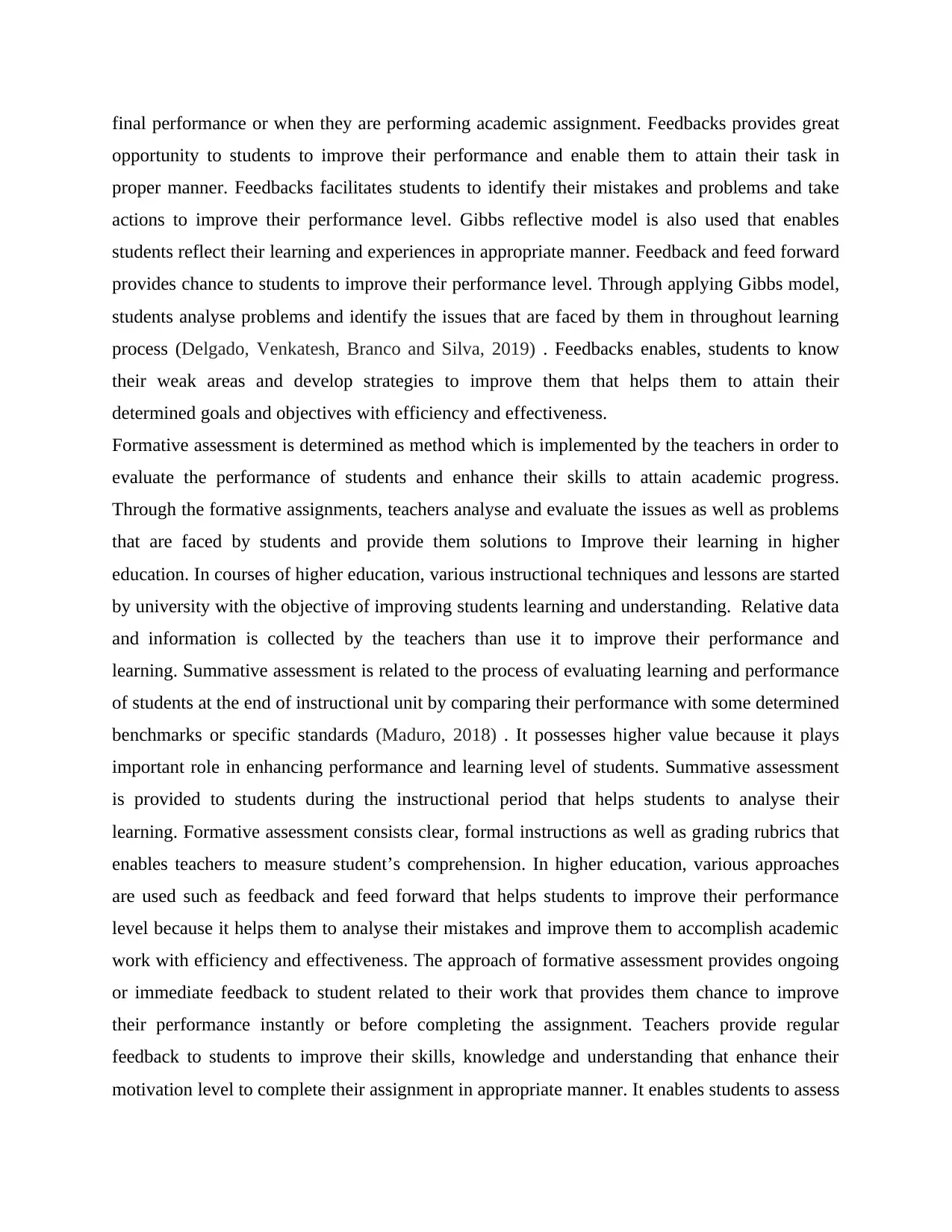
final performance or when they are performing academic assignment. Feedbacks provides great
opportunity to students to improve their performance and enable them to attain their task in
proper manner. Feedbacks facilitates students to identify their mistakes and problems and take
actions to improve their performance level. Gibbs reflective model is also used that enables
students reflect their learning and experiences in appropriate manner. Feedback and feed forward
provides chance to students to improve their performance level. Through applying Gibbs model,
students analyse problems and identify the issues that are faced by them in throughout learning
process (Delgado, Venkatesh, Branco and Silva, 2019) . Feedbacks enables, students to know
their weak areas and develop strategies to improve them that helps them to attain their
determined goals and objectives with efficiency and effectiveness.
Formative assessment is determined as method which is implemented by the teachers in order to
evaluate the performance of students and enhance their skills to attain academic progress.
Through the formative assignments, teachers analyse and evaluate the issues as well as problems
that are faced by students and provide them solutions to Improve their learning in higher
education. In courses of higher education, various instructional techniques and lessons are started
by university with the objective of improving students learning and understanding. Relative data
and information is collected by the teachers than use it to improve their performance and
learning. Summative assessment is related to the process of evaluating learning and performance
of students at the end of instructional unit by comparing their performance with some determined
benchmarks or specific standards (Maduro, 2018) . It possesses higher value because it plays
important role in enhancing performance and learning level of students. Summative assessment
is provided to students during the instructional period that helps students to analyse their
learning. Formative assessment consists clear, formal instructions as well as grading rubrics that
enables teachers to measure student’s comprehension. In higher education, various approaches
are used such as feedback and feed forward that helps students to improve their performance
level because it helps them to analyse their mistakes and improve them to accomplish academic
work with efficiency and effectiveness. The approach of formative assessment provides ongoing
or immediate feedback to student related to their work that provides them chance to improve
their performance instantly or before completing the assignment. Teachers provide regular
feedback to students to improve their skills, knowledge and understanding that enhance their
motivation level to complete their assignment in appropriate manner. It enables students to assess
opportunity to students to improve their performance and enable them to attain their task in
proper manner. Feedbacks facilitates students to identify their mistakes and problems and take
actions to improve their performance level. Gibbs reflective model is also used that enables
students reflect their learning and experiences in appropriate manner. Feedback and feed forward
provides chance to students to improve their performance level. Through applying Gibbs model,
students analyse problems and identify the issues that are faced by them in throughout learning
process (Delgado, Venkatesh, Branco and Silva, 2019) . Feedbacks enables, students to know
their weak areas and develop strategies to improve them that helps them to attain their
determined goals and objectives with efficiency and effectiveness.
Formative assessment is determined as method which is implemented by the teachers in order to
evaluate the performance of students and enhance their skills to attain academic progress.
Through the formative assignments, teachers analyse and evaluate the issues as well as problems
that are faced by students and provide them solutions to Improve their learning in higher
education. In courses of higher education, various instructional techniques and lessons are started
by university with the objective of improving students learning and understanding. Relative data
and information is collected by the teachers than use it to improve their performance and
learning. Summative assessment is related to the process of evaluating learning and performance
of students at the end of instructional unit by comparing their performance with some determined
benchmarks or specific standards (Maduro, 2018) . It possesses higher value because it plays
important role in enhancing performance and learning level of students. Summative assessment
is provided to students during the instructional period that helps students to analyse their
learning. Formative assessment consists clear, formal instructions as well as grading rubrics that
enables teachers to measure student’s comprehension. In higher education, various approaches
are used such as feedback and feed forward that helps students to improve their performance
level because it helps them to analyse their mistakes and improve them to accomplish academic
work with efficiency and effectiveness. The approach of formative assessment provides ongoing
or immediate feedback to student related to their work that provides them chance to improve
their performance instantly or before completing the assignment. Teachers provide regular
feedback to students to improve their skills, knowledge and understanding that enhance their
motivation level to complete their assignment in appropriate manner. It enables students to assess
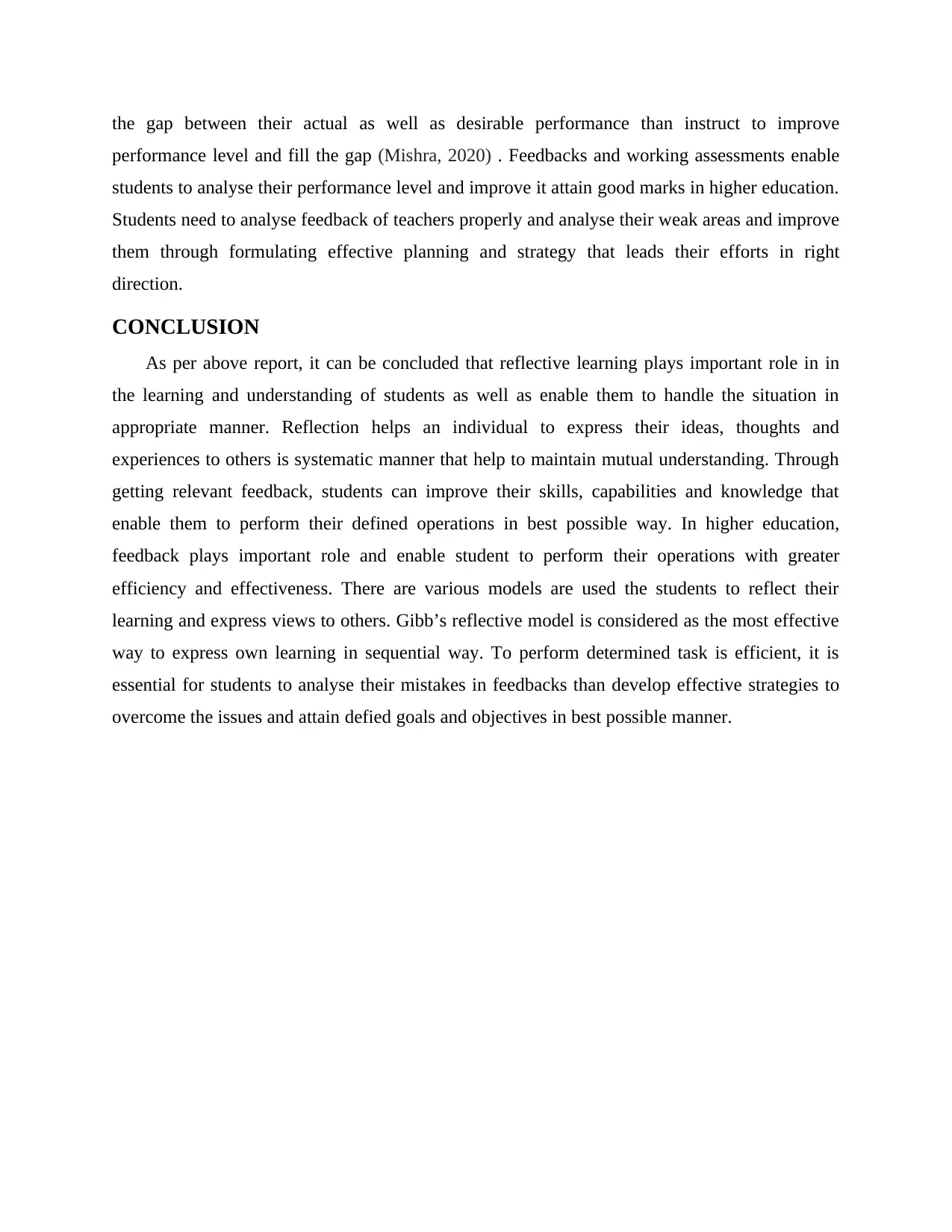
the gap between their actual as well as desirable performance than instruct to improve
performance level and fill the gap (Mishra, 2020) . Feedbacks and working assessments enable
students to analyse their performance level and improve it attain good marks in higher education.
Students need to analyse feedback of teachers properly and analyse their weak areas and improve
them through formulating effective planning and strategy that leads their efforts in right
direction.
CONCLUSION
As per above report, it can be concluded that reflective learning plays important role in in
the learning and understanding of students as well as enable them to handle the situation in
appropriate manner. Reflection helps an individual to express their ideas, thoughts and
experiences to others is systematic manner that help to maintain mutual understanding. Through
getting relevant feedback, students can improve their skills, capabilities and knowledge that
enable them to perform their defined operations in best possible way. In higher education,
feedback plays important role and enable student to perform their operations with greater
efficiency and effectiveness. There are various models are used the students to reflect their
learning and express views to others. Gibb’s reflective model is considered as the most effective
way to express own learning in sequential way. To perform determined task is efficient, it is
essential for students to analyse their mistakes in feedbacks than develop effective strategies to
overcome the issues and attain defied goals and objectives in best possible manner.
performance level and fill the gap (Mishra, 2020) . Feedbacks and working assessments enable
students to analyse their performance level and improve it attain good marks in higher education.
Students need to analyse feedback of teachers properly and analyse their weak areas and improve
them through formulating effective planning and strategy that leads their efforts in right
direction.
CONCLUSION
As per above report, it can be concluded that reflective learning plays important role in in
the learning and understanding of students as well as enable them to handle the situation in
appropriate manner. Reflection helps an individual to express their ideas, thoughts and
experiences to others is systematic manner that help to maintain mutual understanding. Through
getting relevant feedback, students can improve their skills, capabilities and knowledge that
enable them to perform their defined operations in best possible way. In higher education,
feedback plays important role and enable student to perform their operations with greater
efficiency and effectiveness. There are various models are used the students to reflect their
learning and express views to others. Gibb’s reflective model is considered as the most effective
way to express own learning in sequential way. To perform determined task is efficient, it is
essential for students to analyse their mistakes in feedbacks than develop effective strategies to
overcome the issues and attain defied goals and objectives in best possible manner.
⊘ This is a preview!⊘
Do you want full access?
Subscribe today to unlock all pages.

Trusted by 1+ million students worldwide
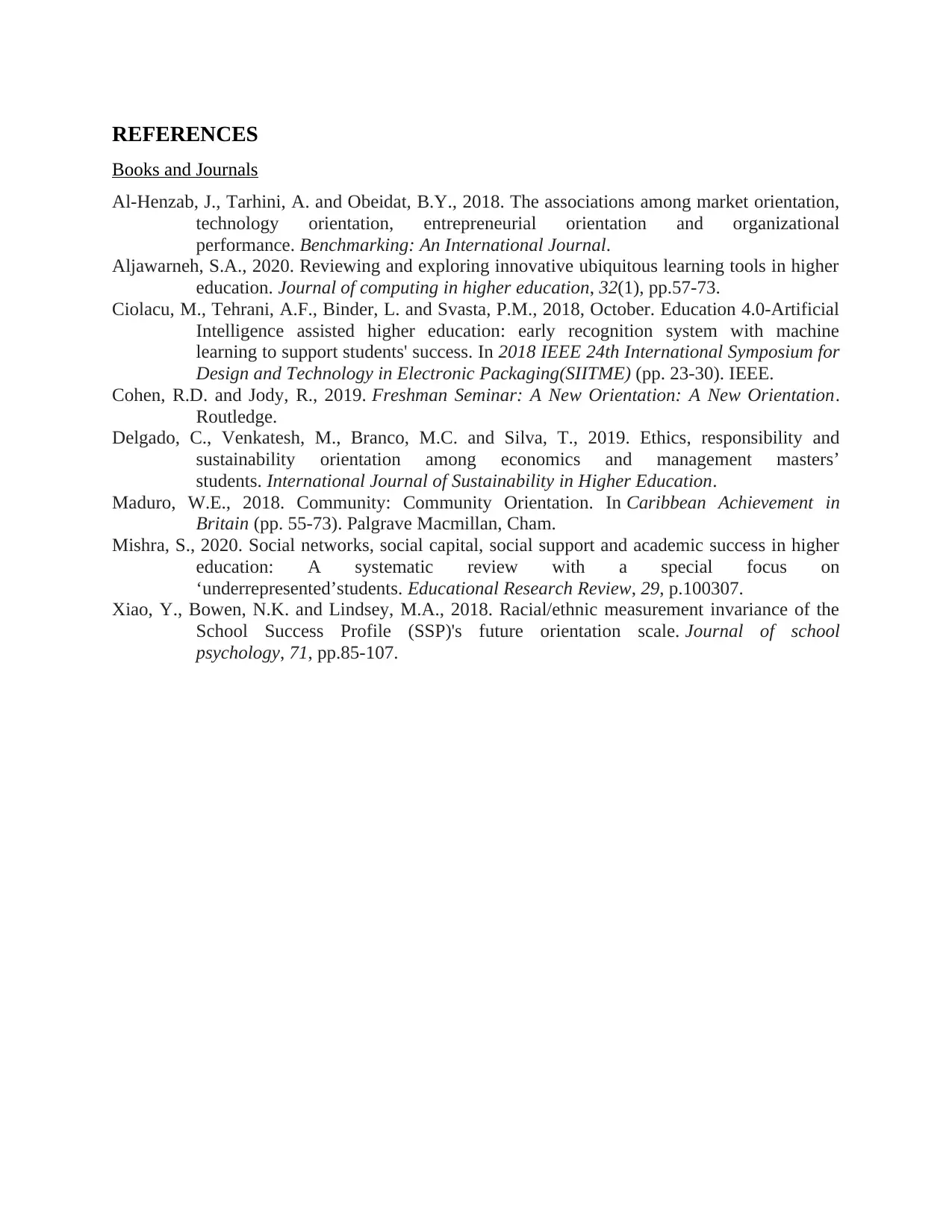
REFERENCES
Books and Journals
Al-Henzab, J., Tarhini, A. and Obeidat, B.Y., 2018. The associations among market orientation,
technology orientation, entrepreneurial orientation and organizational
performance. Benchmarking: An International Journal.
Aljawarneh, S.A., 2020. Reviewing and exploring innovative ubiquitous learning tools in higher
education. Journal of computing in higher education, 32(1), pp.57-73.
Ciolacu, M., Tehrani, A.F., Binder, L. and Svasta, P.M., 2018, October. Education 4.0-Artificial
Intelligence assisted higher education: early recognition system with machine
learning to support students' success. In 2018 IEEE 24th International Symposium for
Design and Technology in Electronic Packaging(SIITME) (pp. 23-30). IEEE.
Cohen, R.D. and Jody, R., 2019. Freshman Seminar: A New Orientation: A New Orientation.
Routledge.
Delgado, C., Venkatesh, M., Branco, M.C. and Silva, T., 2019. Ethics, responsibility and
sustainability orientation among economics and management masters’
students. International Journal of Sustainability in Higher Education.
Maduro, W.E., 2018. Community: Community Orientation. In Caribbean Achievement in
Britain (pp. 55-73). Palgrave Macmillan, Cham.
Mishra, S., 2020. Social networks, social capital, social support and academic success in higher
education: A systematic review with a special focus on
‘underrepresented’students. Educational Research Review, 29, p.100307.
Xiao, Y., Bowen, N.K. and Lindsey, M.A., 2018. Racial/ethnic measurement invariance of the
School Success Profile (SSP)'s future orientation scale. Journal of school
psychology, 71, pp.85-107.
Books and Journals
Al-Henzab, J., Tarhini, A. and Obeidat, B.Y., 2018. The associations among market orientation,
technology orientation, entrepreneurial orientation and organizational
performance. Benchmarking: An International Journal.
Aljawarneh, S.A., 2020. Reviewing and exploring innovative ubiquitous learning tools in higher
education. Journal of computing in higher education, 32(1), pp.57-73.
Ciolacu, M., Tehrani, A.F., Binder, L. and Svasta, P.M., 2018, October. Education 4.0-Artificial
Intelligence assisted higher education: early recognition system with machine
learning to support students' success. In 2018 IEEE 24th International Symposium for
Design and Technology in Electronic Packaging(SIITME) (pp. 23-30). IEEE.
Cohen, R.D. and Jody, R., 2019. Freshman Seminar: A New Orientation: A New Orientation.
Routledge.
Delgado, C., Venkatesh, M., Branco, M.C. and Silva, T., 2019. Ethics, responsibility and
sustainability orientation among economics and management masters’
students. International Journal of Sustainability in Higher Education.
Maduro, W.E., 2018. Community: Community Orientation. In Caribbean Achievement in
Britain (pp. 55-73). Palgrave Macmillan, Cham.
Mishra, S., 2020. Social networks, social capital, social support and academic success in higher
education: A systematic review with a special focus on
‘underrepresented’students. Educational Research Review, 29, p.100307.
Xiao, Y., Bowen, N.K. and Lindsey, M.A., 2018. Racial/ethnic measurement invariance of the
School Success Profile (SSP)'s future orientation scale. Journal of school
psychology, 71, pp.85-107.
Paraphrase This Document
Need a fresh take? Get an instant paraphrase of this document with our AI Paraphraser


⊘ This is a preview!⊘
Do you want full access?
Subscribe today to unlock all pages.

Trusted by 1+ million students worldwide
1 out of 9
Related Documents
Your All-in-One AI-Powered Toolkit for Academic Success.
+13062052269
info@desklib.com
Available 24*7 on WhatsApp / Email
![[object Object]](/_next/static/media/star-bottom.7253800d.svg)
Unlock your academic potential
Copyright © 2020–2026 A2Z Services. All Rights Reserved. Developed and managed by ZUCOL.

